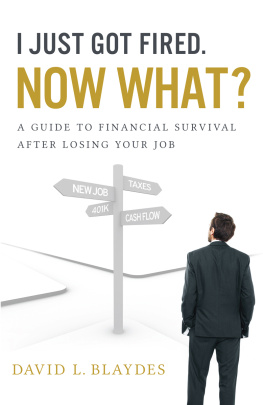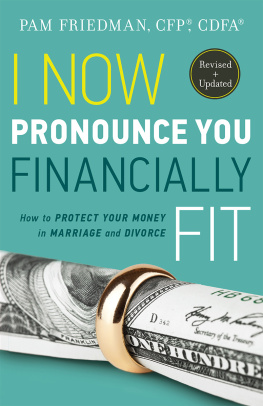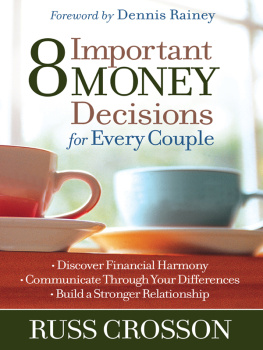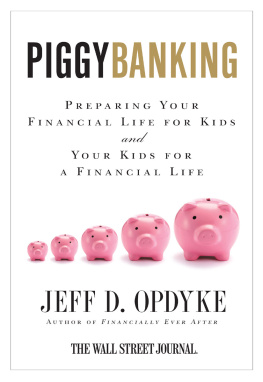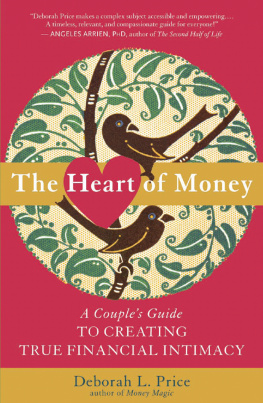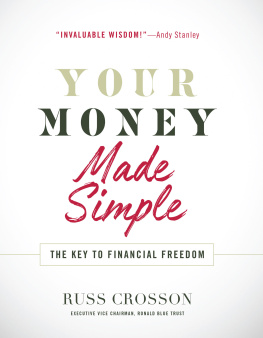

Copyright 2015 by Jeff Motske
All rights reserved. No part of this publication may be reproduced, stored in a retrieval system, or transmitted, in any form or by any means, electronic, mechanical, photocopying, recording, or otherwise, without the prior written permission of the publisher. Printed in the United States of America. For information, address Da Capo Press, 44 Farnsworth Street, 3rd Floor, Boston, MA 02210.
Designed by Trish Wilkinson
Set in 11.5-point Goudy Old Style STD by the Perseus Books Group
Library of Congress Cataloging-in-Publication Data
Motske, Jeff.
The couples guide to financial compatibility : avoid fights about spending and savingand build a happy and secure future together / Jeff Motske. First Edition.
pages cm
Includes bibliographical references and index.
ISBN 978-0-7382-1817-5 (e-book) 1. Finance, Personal. 2. ParentsFinance, Personal. I. Title.
HG179.M687 2015
First Da Capo Press edition 2015
Published by Da Capo Press
A Member of the Perseus Books Group
www.dacapopress.com
Note: The names and identifying details of people associated with events described in this book have been changed. Any similarity to actual persons is coincidental.
Da Capo Press books are available at special discounts for bulk purchases in the U.S. by corporations, institutions, and other organizations. For more information, please contact the Special Markets Department at the Perseus Books Group, 2300 Chestnut Street, Suite 200, Philadelphia, PA 19103, or call (800) 810-4145, ext. 5000, or e-mail special..
10 9 8 7 6 5 4 3 2 1
To my beautiful wife, Kendrayou are amazing.
CONTENTS
T he Couples Guide to Financial Compatibility is about love and money. Or, more specifically, its about how to have a healthy relationship with both money and your spouse. Its about how to avoid the all-too-common fights regarding spending, saving, investing, and the like. Its about how to build your financial house with the person you love and, perhaps more importantly, how to live happily and harmoniously while doing so.
Its the book every couple needs to read now in order to avoid shelling out thousands of dollars in therapy later. As you may well know, the number-one thing couples fight about is moneynot laundry, not dishes, not housekeeping, not sex (though its often used as a bargaining chip) but rather those crisp, green Benjamins. Money matters invariably create conflict, so in order to have a happy marriage, couples must get on the same financial page. Period.
If youre reading this, theres a pretty good chance youre at odds already and that youre in need of an independent ref, a voice of reason who is unbiased and will give you some sensible solutions. Thats where I come in.
Ive been a financial advisorwhich involves lots of relationship counseling!for over two decades. My team of 150 advisors has helped more than fifty thousand clients around the nation achieve financial independence. Our clients range from couples worth eight dollars to those worth eight figures. Yet no matter their wealth, I am constantly astounded at how little some couples know about their finances. Ill ask a simple questionsay, How much does your partner earn?and theyll look at me as if I have five heads.
We dont talk about money, theyll say, or, Thats not my department.
Theyyouare not alone. In a Readers Digest survey of one thousand married couples, 48 percent of wives and 49 percent of husbands said they kept how much they paid for something from their spouses. Interestingly, those with higher incomes lied more about what they spent. The point here is this: many couples dont communicate openly and honestly when it comes to money, no matter how much of it they make!
To say this does not bode well for the relationship is putting it very, very mildly. A 2013 study authored by Jeffrey Dew, Sonya Britt, and Sandra Huston found that one of the best indicators of marital discord is what they call financial disagreements. Couples who fight about finances once a week are 37 percent more likely to get divorced than couples who rarely argue about finances. Those who fight daily are 69 percent more likely to get divorced compared to couples who rarely fight about money.
In his study Dew examined the responses of 4,574 couples surveyed by the National Survey of Families and Households in 1987 and again in 1992. Of all the issues that typically caused disputeshousework, in-laws, spending time together, sex, and moneymoney disputes were the greatest harbinger of marital unhappiness and, ultimately, divorce.
Financial discord exacts a huge toll on a marriage. Although people commonly get caught up in disagreements over current spending habits, its the excessive accumulation of debt that becomes an unwelcome stranger in their marital bed. Long before these couples even realize theyve been living well beyond their means, the burden of overwhelming debt begins wreaking havoc in their lives, more often than not to the detriment of their relationship.
Many times a lack of communication is to blame. Again and again I hear stories from couples who have no idea how the person they married goes about paying the monthly bills. Or that one spouse owes thousands of dollars in credit card debt. Or, on a more basic level, that one has dreams of traveling the world, whereas the others goal is to save for retirement. And thats the problem.
Because though couples may talk about whether theyre spiritually aligned or how many kids they want or if theyd like to live in the country or the city, they almost never consider their financial compatibility. They dont discuss whether their views align on dual-income households, taxes, savings, or making a down payment on a house. And they should. Its far better to figure these things out now so they dont take you by surprise and lead to conflict later in life.
Take my clients Jed and Susie, who fell madly in love when they met five years ago. Hes a litigator, and she works as a lawyer for a nonprofit. They married in 2011 and had a baby a year later. After the baby was born Susie wanted to quit her job to be a full-time mom. In her mind that was always the plan. Sure, she made a nice salarythough not nearly as much as her husbandbut they didnt need the extra income, so staying at home seemed like a wise decision. Not only would she get to be their babys primary caregiver rather than turning that role over to a virtual stranger, but Susie reasoned that they would save money in expenses shed otherwise incur for work, such as child care, clothing, dry cleaning, gas, lunches, and so forth.
Susie conveyed her plan to Jed, who, much to her dismay, was completely caught off guard. Why? Because they never bothered to discuss it ahead of time. Jed just made the assumption that Susie would return to work after she had the baby. In his mind they could afford outside child care, but more notably, he had grown accustomed to the lifestyle their dual incomes provided. Jed and Susie simply had different expectations about what their lives should look like after the baby was born. They did not see eye to eye on how much money was enough or on whether they could afford to live off of just one salary.
Next page

